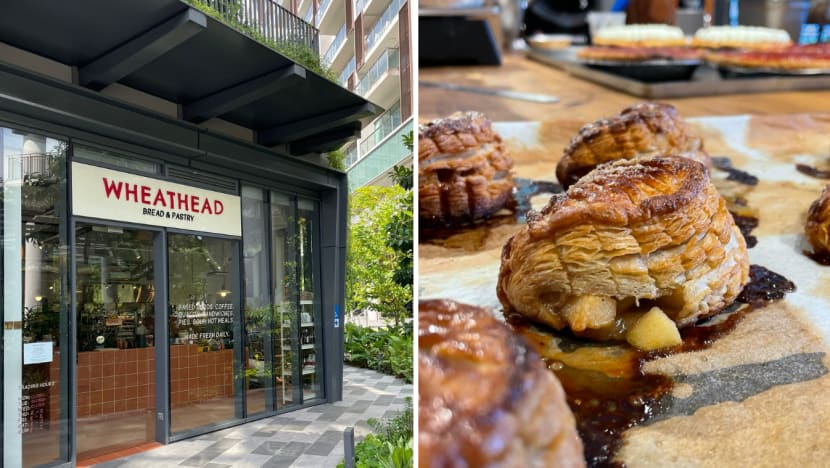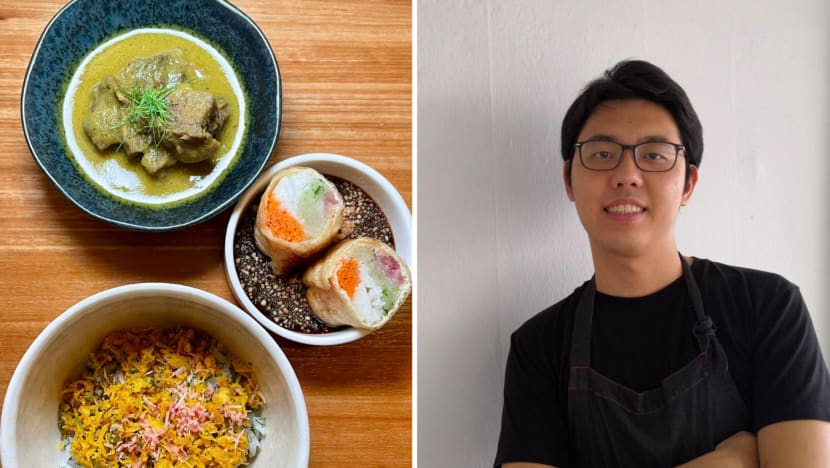SINGAPORE: What would it take to leave the comforts of running a business from home – with no commercial rent and in successful cases, a continuous stream of customers – to set up shop outside?
The pressure of working alone, the itch to answer "what if?" and the hunger to serve patrons the best possible version of your product, according to some chefs who have done just that.
Recently, debate has stirred over whether home-based food and beverage (F&B) businesses enjoy an unfair advantage over restaurants, which have been closing in record numbers.
In a commentary for CNA, former restaurant and bar owner Chua Ee Chien questioned the "minimal oversight" of home-based eateries and asked if this should spur a rethinking of F&B regulations, such as tiered requirements.
Despite what seems like an unlevel playing field, some home-based F&B owners are still choosing to venture into commercial spaces.
They acknowledge that running a full-fledged eatery brings higher risks, but are taking on the challenge to push the limits of their businesses and themselves.
FLYING THE COOP
Mr Karthik Bakthavathsalem, course manager of Nanyang Polytechnic's diploma in F&B business, said that while the vast majority of its graduates enter the industry through established brands, there is a small but growing shift of young Singaporeans exploring home-based ventures instead of traditional restaurant jobs.
Wheathead bakery owner Marilyn Lee started that way, churning out pies, galettes, bread and other sweet and savoury pastries from ovens in her family's flat for two-and-a-half years.
She told CNA the biggest advantage to running a home-based business was the flexible schedule and power to choose how much she wanted to work.
"(But) if you put out a product that is on par with restaurants or cafes in terms of quality, I don't think there are any corners that can be cut."
 Marilyn Lee started Wheathead bakery out of her family's flat before setting up a shop at Buona Vista in 2024. (Photos: Marilyn Lee)
Marilyn Lee started Wheathead bakery out of her family's flat before setting up a shop at Buona Vista in 2024. (Photos: Marilyn Lee)
Last December Ms Lee, 31, moved Wheathead into a shop at Buona Vista, which takes walk-in customers - but has limited dine-in space - as well as online orders.
The move was spurred by the progress Ms Lee saw in order volumes, which convinced her that Wheathead could be a viable business.
But it was also about shaking off the restrictions and inefficiencies of staying home-based.
Working from home meant there was not enough space for equipment like a dough sheeter, deck oven and spiral mixer, which she needed for certain baked goods. Some of these require three-phase power, which Housing Board flats simply do not supply.
The limitations of household ovens and mixers meant she had to do more things by hand or make several batches of one item.
Producing on a smaller scale also jacked up the cost of ingredients, because she was sourcing them from retail grocers and not directly from suppliers. This involved making multiple trips to stores, which in turn took up more time.
For Jeffrey Yeo, chef-owner of Ovenbird, it was a very specific ingredient that drove his supper club out of his Yishun flat after about two years and into a restaurant in City Gate mall.
"SFA (Singapore Food Agency) prohibits home-based businesses from serving ready-to-eat raw fish or seafood. I'm specialising in Singapore-Japanese fusion," said the 53-year-old.
 Jeffrey Yeo obtained a food shop licence for Ovenbird because home-based businesses are not allowed to sell ready-to-eat raw seafood. (Photos: Facebook/Ovenbird SG)
Jeffrey Yeo obtained a food shop licence for Ovenbird because home-based businesses are not allowed to sell ready-to-eat raw seafood. (Photos: Facebook/Ovenbird SG)
Then there is Mustard Seed's chef-owner Gan Ming Kiat, 36, who gave himself a one-year trial period when he started serving dinners at his parents' home in Potong Pasir in 2017.
The end result was a restaurant in Serangoon Gardens in 2019.
"One of the reasons for the change is that I did not want to stagnate, I wanted to push myself to grow as a person, a chef, a leader and a business owner," he said.
"I'm glad that over the last six years that has come to fruition and it's been an exciting and rewarding journey."
For him, lower costs and risks were also upsides of running Mustard Seed from home, while the main downside was the lonely and taxing nature of working alone.
WHAT CHANGED AFTER
When Mustard Seed operated out of his parents' home, Mr Gan served three to four dinners a week, charging S$88 (US$69) for each of the eight diners each time.
Eight years on, his commercial version serves both lunch and dinner and charges S$238 per meal.
Mr Gan declined to go into the specifics of his current business model, but said the costs and pressures of running a shop were "significantly higher".
NYP's Mr Karthik pointed to restaurants having to pay commercial rent, hire full-time staff, go through safety audits and contribute goods and services tax, among others.
Rents are a longstanding pain point for businesses, recently prompting discussions about the need for retail lease reforms and perceived competition from Chinese brands.
There are also expenses associated with obtaining and maintaining food licences, which home-based businesses do not incur.
The criteria for a licence - which costs S$195 a year - include a pest control contract, design specifications, cleaning schedules, up-to-date food safety certificates and more.
Ms Lee pointed out that the design requirements - like a minimum kitchen area and specifics for exhaust system - can be expensive.
Ensuring tax compliance also brings significantly higher costs.
When Wheathead was home-based, expenses ran up to about 60 to 70 per cent of revenue. After moving to a shop, revenue grew by four to five times, but overheads and expenses also increased by the same amount, she said.
Aside from rent, she pointed to difficulties finding manpower. Only migrant workers are willing to work in F&B given the long hours, low pay and customer-facing nature of the job; but businesses must first hire locals to achieve a mandated quota, she said.
Ingredient costs have also risen "non-stop" due to global conflicts disrupting shipping routes, climate change affecting agricultural production, and higher prices of raw materials.
"Every month that I can pay my staff and suppliers and keep the lights on, I'm happy," said Ms Lee.
 Mustard Seed's chef-owner Gan Ming Kiat said the restaurant has to "think several layers deeper than a home-based business". (Photos: Gan Ming Kiat)
Mustard Seed's chef-owner Gan Ming Kiat said the restaurant has to "think several layers deeper than a home-based business". (Photos: Gan Ming Kiat)
Mr Gan said that compared to private dining, food and service expectations are much higher in a shop setting - further adding to costs
"A guest would not bat an eyelid if he needed to top his own water up in a private dining setting. But a constantly empty water cup might warrant a complaint in a restaurant. Labour is needed to ensure that does not happen," he said.
"For a restaurant like Mustard Seed, we don't feel comfortable serving guests tap water, so we have invested in a water filtration system. But because we decided not to charge for water, it's also another cost we bear."
For Ovenbird's Mr Yeo, "nothing much has changed" apart from rent and operational costs, such as for internet, credit card terminals and licensing requirements.
Describing himself as a "hawker in a mall", he said it was good enough that his one-man operation was "staying afloat" after four years.
SPACE FOR ALL
Last year, 3,047 F&B outlets closed in Singapore. This was the highest figure in almost 20 years, averaging about 254 closures a month.
So far, in the first half of 2025, F&B closures have trailed, totalling 1,404 or an average of 234 closures a month.
Yet at the same time, the pace of new F&B openings has quickened from a monthly average of about 316 last year to around 327 in the first half of 2025.
Amid Singapore's increasingly crowded F&B landscape, the chef-owners who spoke to CNA believe that home-based eateries continue to play an important role.
"The costs to set up and run a business are too high in Singapore now. Home-based businesses (are) a good way for the scene to grow as the risks are much lower," said Mr Gan.
Said Ms Lee: "Maybe restaurants and cafes should focus on their unique selling points rather than feel upset about the emergence of home-based businesses.
"I think the market is big enough for both types of businesses to coexist, and the challenges faced by commercial and home-based businesses are quite different."
Mr Karthik described home-based F&B ventures as bringing "intimacy, agility and cultural depth" that are increasingly difficult to achieve in restaurant settings.
"Meanwhile, restaurants provide scale, service, consistency and trained teams – the backbone of any food economy," he said, adding that "there is a value in structure that cannot be replaced purely with innovation".
With Singaporeans dining out an average of three to four times a week, "the appetite is there for both formats to flourish".
"Restaurants and home-based businesses aren't enemies. They're different expressions of food culture and if supported fairly, they can inspire and uplift one another."


















































